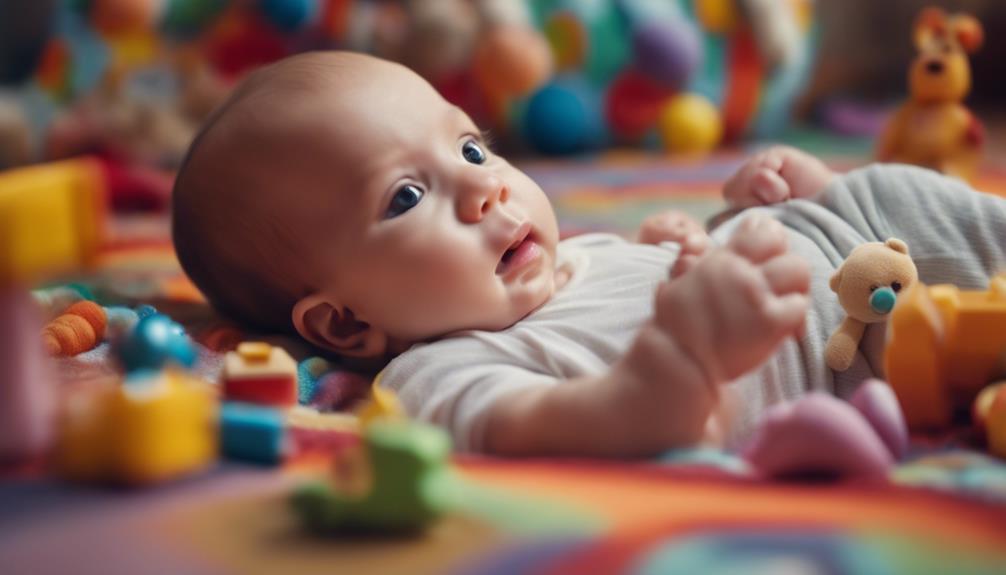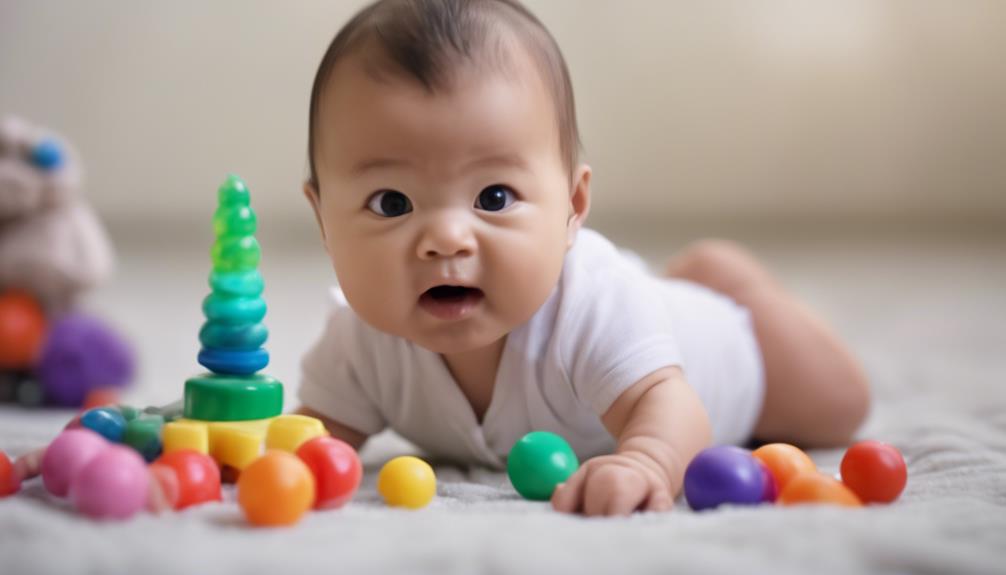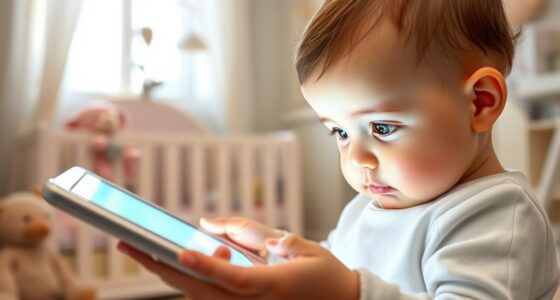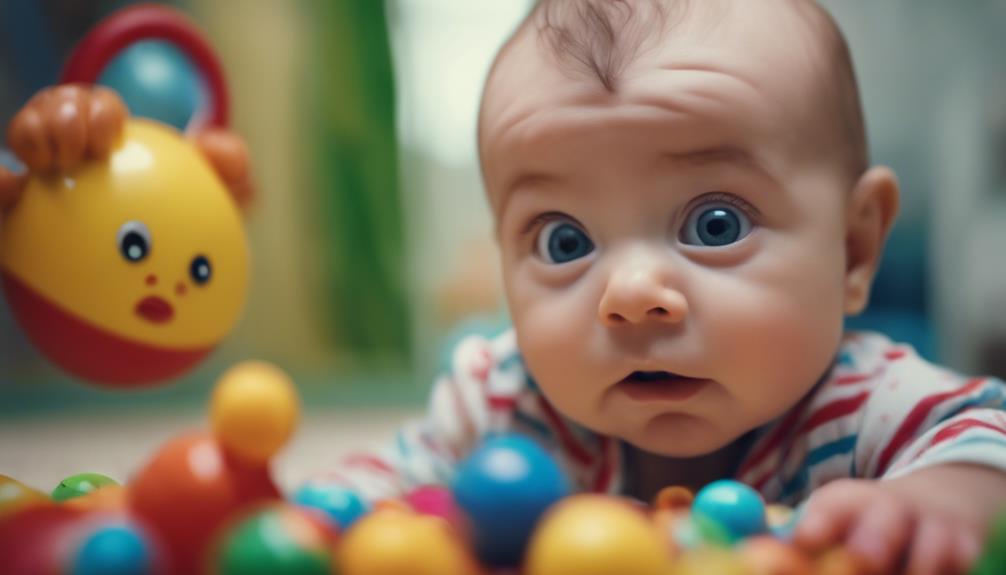At two months old, your baby is starting to process a variety of sensory experiences, which helps them form crucial neural connections. They are showing early signs of grasping cause and effect, which is a significant cognitive milestone. Recognizing familiar routines provides them with a sense of security, which helps with cognitive growth. Regular interactions with caregivers, such as talking, playing, and making eye contact, are crucial for their intellectual development. Through play, like shaking a rattle, they are enhancing their cognitive skills. By responding to sounds and visual cues, your baby is beginning to develop auditory and visual coordination. Encouraging sensory exploration and language development will support their cognitive journey. There are further insights into your baby’s intellectual growth to look forward to.
Key Takeaways
- Sensory experiences shape neural connections and cognitive growth.
- Understanding cause and effect milestones aids problem-solving skills.
- Familiar routines create security and cognitive development.
- Caregiver interactions stimulate brain development and learning abilities.
- Play activities enhance cognitive growth, social bonding, and memory skills.
Sensory Processing and Stimulation
To support your 2-month-old baby's intellectual development, focus on providing diverse sensory experiences that engage their developing senses. At this stage, your baby is reaching important developmental milestones in sensory processing. By exposing them to a variety of stimuli like toys with different textures, gentle music, colorful visuals, and soothing scents, you're helping them make sense of the world around them.
Sensory experiences not only captivate your baby's interest but also lay the foundation for future learning and understanding. These interactions are vital for enhancing cognitive development and fostering curiosity in your little one. Each sensory input plays a key role in shaping your baby's perception of their environment and aids in forming neural connections in their brain.
Cause and Effect Understanding
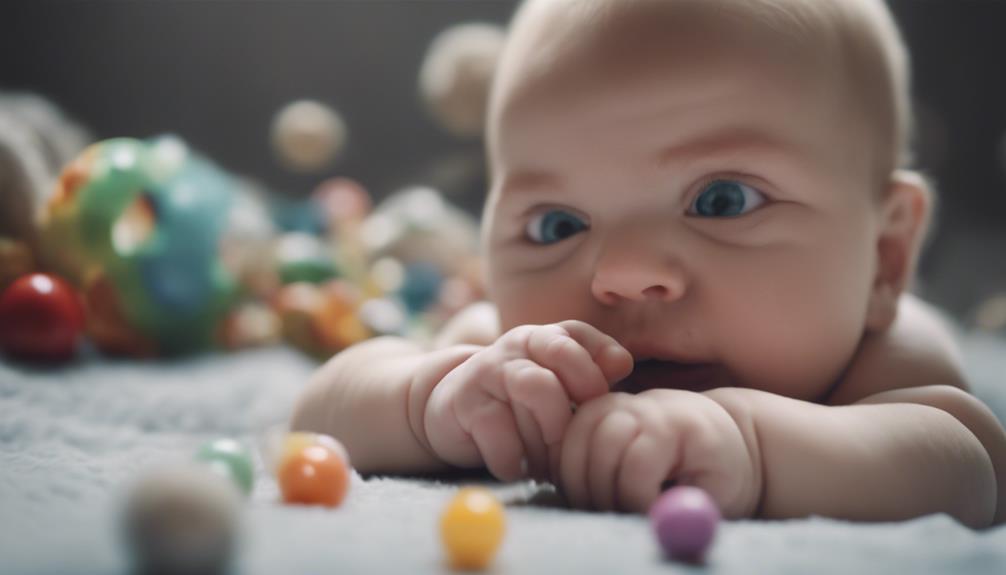
Understanding cause and effect at 2 months old marks a significant cognitive milestone in your baby's development. At this stage, your little one begins to grasp that their actions can lead to specific outcomes.
For example, they may kick a mobile and observe it moving in response. Showing interest in repetitive actions is common as babies seek consistent results, indicating their growing awareness of cause and effect relationships. Simple games like peek-a-boo can further help babies understand this concept.
Recognizing cause and effect is an important step in your baby's cognitive development, laying the groundwork for future problem-solving skills. These early milestones in understanding how the world works pave the way for more complex reasoning abilities as your baby grows.
Encouraging and nurturing this cause and effect understanding through interactive play and engaging activities can support your baby's intellectual growth during this formative period.
Familiar Routine Anticipation
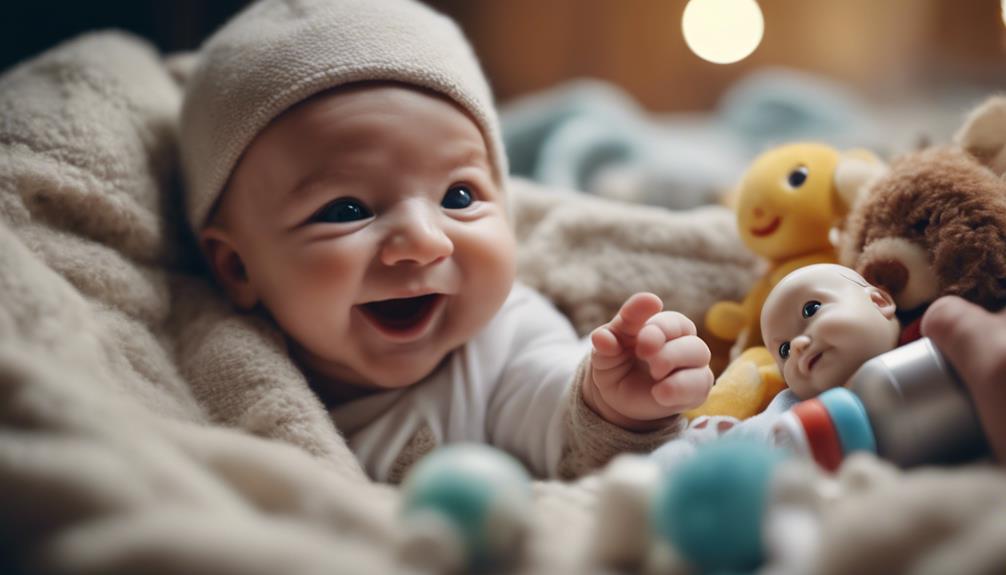
At two months old, your baby is starting to recognize familiar routines, like feeding and sleeping times. This anticipation of daily activities helps them understand what to expect next, creating a sense of security and stability.
Routine Anticipation Cues
Recognize how a 2-month-old baby may exhibit familiarity with routines by anticipating actions like feeding or bedtime. Babies at this age can display signs of readiness or excitement for familiar routines through their body language and facial expressions. The importance of daily activities plays a significant role in helping babies anticipate what comes next, providing them with a sense of security and predictability. Anticipation cues within routines can enhance a baby's engagement, involvement, and connection with their caregivers. By acknowledging and responding to a baby's anticipation cues in routines, the bond between the caregiver and the child can be strengthened.
| Anticipation Cues in Routines | Benefits |
|---|---|
| Readiness for feeding time | Enhances bonding and trust |
| Excitement for bedtime routine | Fosters predictability and security |
| Responsive to caregiver's cues | Promotes emotional development |
Cognitive Response Patterns
You may notice your 2-month-old baby exhibiting cognitive response patterns through their anticipation of familiar routines. At this age, babies begin to recognize familiar routines like bedtime or feeding times. They show cognitive responses by displaying excitement or calmness when anticipating these activities.
This familiar routine anticipation plays an essential role in helping babies feel secure and understand the predictability of their environment. When expecting a specific routine, babies might show increased alertness or engagement, indicating their developing cognitive abilities.
Recognizing familiar routines at 2 months is a significant sign of cognitive development and increasing awareness in babies. By responding to these familiar routines, babies start to build a sense of consistency and expectation in their daily lives, which contributes to their overall cognitive growth and understanding of the world around them.
Developmental Progress Indicators
Anticipating familiar routines is a key developmental indicator for a 2-month-old baby, showcasing their growing cognitive abilities and understanding of their environment. This milestone is vital for the baby's development as it provides a sense of security and predictability, fostering trust and comprehension of the world around them.
Here are some indicators of developmental progress related to familiar routine anticipation:
- Recognition of caregivers, surroundings, and activities.
- Display of signs of excitement or calmness in response to familiar routines.
- Contribution to a sense of security and predictability.
- Development of trust and understanding of the environment.
- Display of cues like increased alertness or engagement when familiar routines are introduced.
These cues demonstrate the baby's evolving cognitive capabilities and their ability to anticipate and respond to familiar stimuli, marking significant developmental milestones in their intellectual growth at this early stage.
Caregiver Interaction Importance
Interacting regularly with your 2-month-old baby is important for fostering their intellectual development. By meeting your baby's needs promptly and engaging in activities like talking, singing, and playing, you play a significant role in nurturing their cognitive growth.
Reading books, singing songs, and making eye contact with your baby not only create a bond but also stimulate their brain development. Responding sensitively to your baby's cues and providing a nurturing environment lay a strong foundation for their future learning abilities.
Your interactions help build neural connections in your baby's brain, supporting their overall intellectual advancement. Research shows that caregiver interaction is essential in shaping a child's cognitive abilities from a very young age.
Therefore, your involvement in your baby's daily routine is key to promoting their intellectual development and creating a supportive environment that fosters learning and growth.
Cognitive Growth Through Play
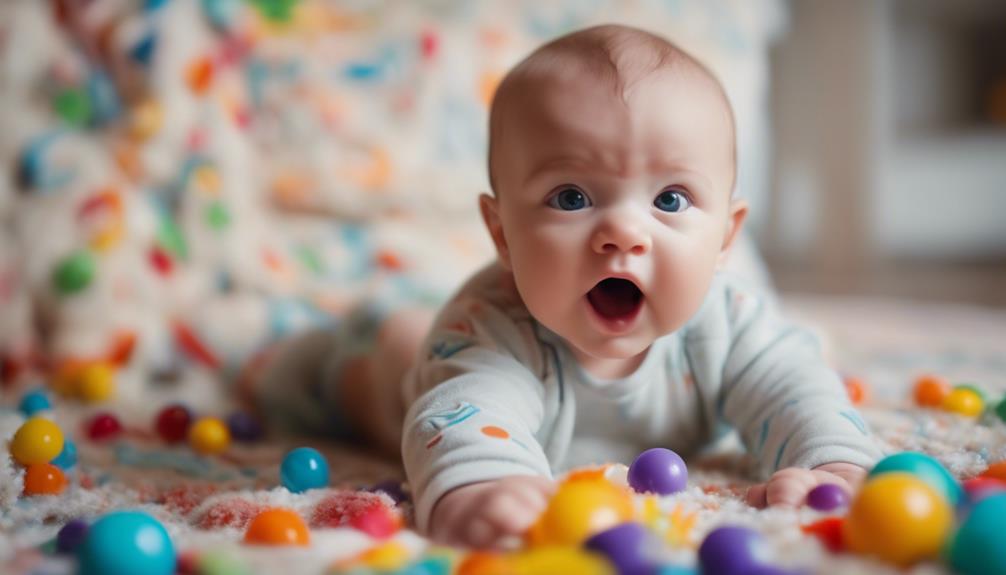
Engaging in play activities with your 2-month-old baby can actively stimulate their cognitive growth by engaging their senses and encouraging exploration. Play helps in the development of cognitive skills through various simple activities.
Here's how play contributes to your baby's cognitive growth:
- Simple activities like shaking a rattle or showing bright pictures can capture your baby's attention and promote cognitive development.
- Through play, babies at this age start recognizing familiar faces and objects, laying the foundation for memory and recognition skills.
- Playtime with caregivers helps babies learn cause and effect, develop hand-eye coordination, and improve their focus and attention span.
- Interactive play promotes social bonding, emotional development, and language skills in 2-month-old babies.
Language Development Progress
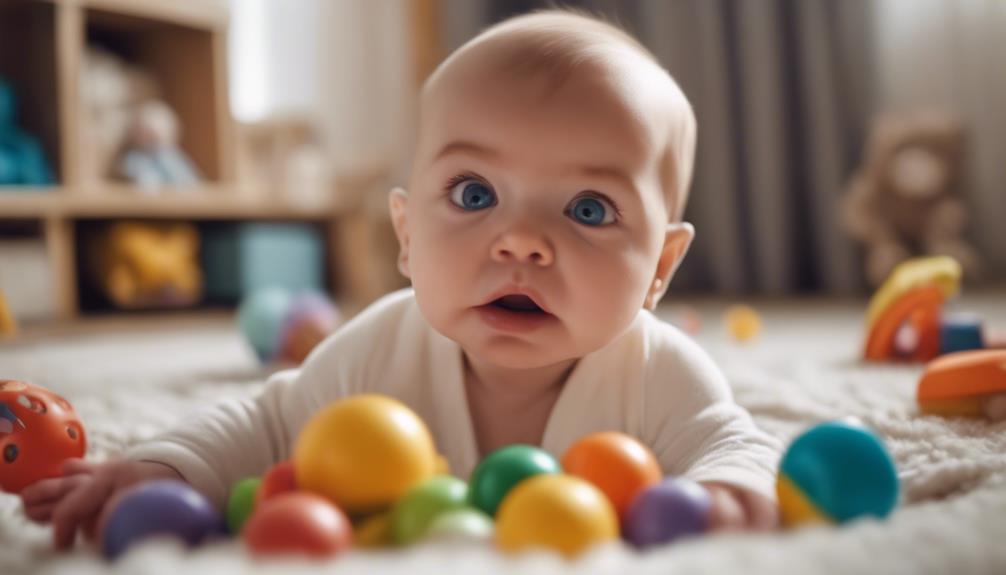
By interacting with your 2-month-old baby through talking, reading, and singing, you can observe significant progress in their language development. At this stage, babies start making cooing sounds to communicate, showing early signs of language development. They respond to caregivers' voices by turning towards them, displaying an awareness of sounds. Encouraging language development involves responding to your baby's sounds, engaging in conversations through their cooing noises, and fostering communication skills. As caregivers, you play a crucial role in nurturing these language skills by actively participating in activities like talking, playing, and singing with your baby.
| Language Development Progress |
|---|
| Start making cooing sounds |
| Responding to caregivers' voices |
| Engaging in conversations through cooing |
| Fostering communication skills |
| Encouraging interaction through talking, playing, and singing |
Visual and Auditory Awareness
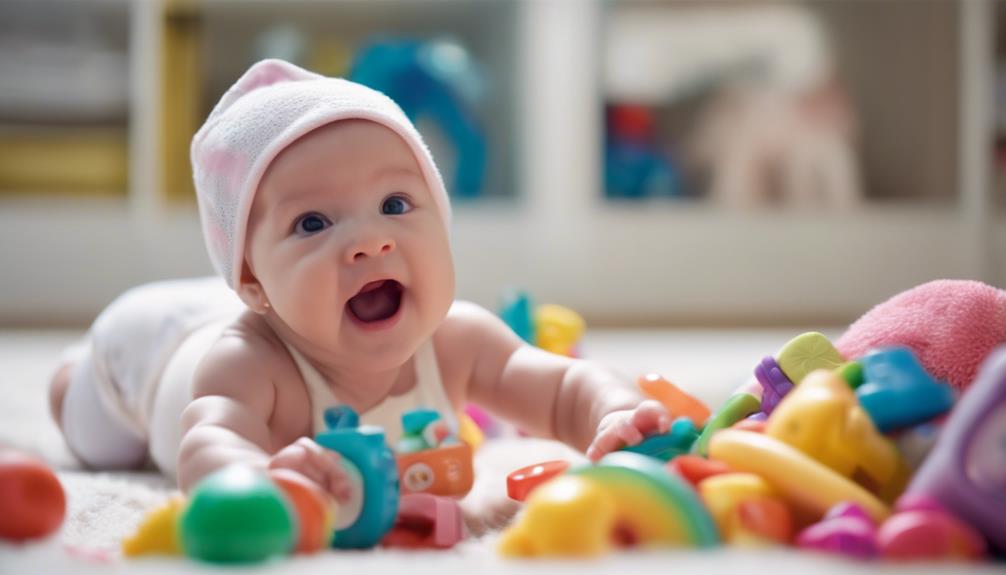
At two months old, your baby is beginning to show impressive visual tracking skills, following moving objects with their eyes as they explore the world around them.
Additionally, their sensitivity to sounds is evident as they startle in response to loud noises, showcasing their developing auditory awareness.
Providing opportunities for sensory exploration through colorful toys and different sounds can further stimulate their growing visual and auditory senses.
Visual Tracking Skills
The intellectual development of a 2-month-old baby includes the emergence of visual tracking skills, enabling them to follow moving objects and faces with their eyes.
As your baby grows, they start to track caregivers' movements, enhancing their ability to engage with the surrounding environment.
Engaging in activities like shaking a rattle can further develop these skills, stimulating both visual and auditory awareness.
- Tracking Movements: Babies at this age can track moving objects and faces.
- Caregiver Interaction: Visual tracking skills allow the baby to follow a caregiver's movements and gestures.
- Auditory Response: The baby begins to respond to sounds by turning their head.
- Enhancing Skills: Activities like shaking a rattle help improve visual and auditory tracking abilities.
- Development Importance: Visual and auditory development are vital for the baby to interact with their environment and caregivers.
Response to Sounds
Your 2-month-old baby's response to sounds demonstrates early auditory awareness and their growing visual and auditory coordination. At this stage, your baby will turn their head towards sounds, showcasing their ability to locate the source of different noises.
They might also startle in reaction to loud sounds, indicating their sensitivity to auditory stimuli. Interestingly, visual and auditory responses are closely linked, as your baby tracks moving objects and faces with their eyes.
It's paramount to foster language development by actively engaging with your baby through talking, reading, and singing, as they're highly alert and responsive to sounds in their environment. Interactive activities such as shaking a rattle can provide valuable insights into your baby's reactions and their improving visual and auditory coordination.
Sensory Exploration Opportunities
Engage your 2-month-old baby in sensory-rich environments to encourage their visual and auditory exploration and awareness. Providing opportunities for sensory exploration can greatly benefit your little one's development at this stage.
Here are some ways to enhance your baby's sensory experiences:
- Use contrasting colors: Introduce toys and visuals with high color contrast to attract your baby's visual attention.
- Play music and sounds: Incorporate gentle music or sounds into your daily routine to stimulate auditory senses.
- Talk and sing to your baby: Engaging in conversations and singing can help your baby develop their auditory skills.
- Introduce different textures: Allow your baby to touch various textures to enhance their tactile sensory exploration.
- Rotate toys and visuals: Keep changing the toys and images around your baby to provide new stimuli for their sensory development.
Frequently Asked Questions
How Smart Is a 2 Month Old Baby?
You might wonder, how smart is a 2-month-old baby? At this stage, they're laying the groundwork for cognitive skills, like recognizing faces and getting bored. Engage them with colorful objects and talking to foster their development.
What Should a 2 Month Old Baby Be Doing Developmentally?
Hey you, at 2 months, your little one should be showing off smoother movements, holding their head up, recognizing peeps, tracking objects with those cute eyes, self-soothing, cooing, and engaging in bonding activities. Enjoy the milestones!
What Are 4 Signs of Intellectual Growth in an Infant?
You're seeing increased recognition of familiar faces, improved focus on objects, growing curiosity about surroundings, and heightened responsiveness to stimuli. These signs indicate your little one's intellectual growth and emerging problem-solving abilities at this stage.
What Is the Social Development of a 2 Month Old Baby?
You may notice your 2-month-old starting to smile at others and trying to look at familiar faces. Skin-to-skin contact, eye contact, and conversations help them develop social awareness and engage with the world around them.
Conclusion
To sum up, the intellectual development of a 2-month-old baby is a fascinating process full of sensory exploration, cognitive growth, and language progression.
Through sensory processing, cause and effect understanding, and caregiver interaction, babies at this age are laying the foundation for future learning and development.
By engaging in play, establishing familiar routines, and fostering visual and auditory awareness, caregivers can support and nurture their baby's intellectual growth.
Stay tuned for more insights into your baby's journey of discovery and development.

